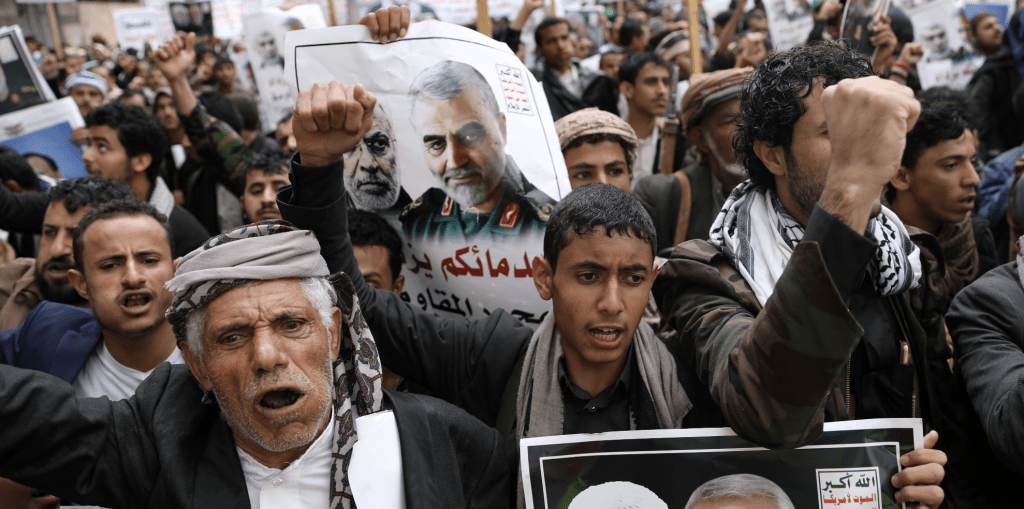Yemen proxy war questions asked with new Russian involvement

Supporters of the Houthis rally to denounce the U.S. killing of Iranian military commander Qassem Soleimani and Iraqi militia commander Abu Mahdi al-Muhandis, in Sanaa, Yemen January 6, 2020. The placards read: "God is the Greatest, Death to America, Death to Israel, Curse on the Jews, Victory toÊIslam." REUTERS/Khaled Abdullah
The United States imposed sanctions on Russia-based people and entities working to procure weapons and commodities for the Iran-backed Houthis in Yemen, in what many consider to be another development in the Russian-Iranian alliance proxy war with the US, sparking fears of an escalation to mirror the Syrian conflict, according to Asharq Al-Awsat.
The partnership between Russia and Iran, which is growing due to military cooperation in Moscow’s war against Ukraine, is reverberating in war-torn Yemen.
A statement from the US Treasury reported that the operatives, Russia-based Afghan businessmen Hushang Ghairat and his brother Sohrab Ghairat, helped senior Houthi official Sa’id al-Jamal, procure millions of dollars’ worth of commodities from Russia for shipment to Houthi-controlled parts of Yemen. The goods included weapons and sensitive goods, as well as stolen Ukrainian grain.
Some experts believe that this surge in Middle Eastern conflict is a direct consequence of Iran’s awareness of the former Biden administration’s fear of a regional escalation and sought to exploit that fact as a means of influencing the course of the war in Gaza.
Ali Alfoneh, a senior fellow at the Arab Gulf States Institute in Washington, believed Iran was trying “to instrumentalize that fear by directly ordering, indirectly encouraging, or acquiescing to proxy attacks against Israel, the US, and international shipping.”
He added that this pressure was in hopes that an administration reluctant to lose assets would increase pressure on Israel to end the war “before total destruction of Hamas”.
The Houthis began targeting shipping after the start of the Gaza war, claiming solidarity with Palestinians.
Treasury Secretary Scott Bessen said, “The Houthis remain reliant on Sa’id al-Jamal and his network to procure critical goods to supply the group’s terrorist war machine… Today’s action underscores our commitment to degrading the Houthis’ ability to threaten the region through their destabilizing activities.”
Houthi-held parts of Yemen have faced near-daily attacks since the US launched a military offensive on March 15 to stop them from threatening vessels in key maritime routes. On the first day alone, US officials said they killed senior Houthi leaders, while the militia’s health ministry said 53 people were killed.
The US-Iran proxy war angle is nothing new to Arab news, however, the Russian-Iranian relationship spread to the borders of Yemen when Iran brokered talks to secure missiles in September, last year.
The Russian-Iranian talks to secure missiles were forced to abandon the idea under pressure from the United States and Saudi Arabia.
However, UN experts have repeatedly reported attempts to smuggle 9M133 Kornet anti-tank guided missiles, AKS-20U assault rifles, and other weapons to Yemen: i.e., weapons with the same technical specifications and markings as those produced in Russia. Iran also appears to have been involved in this scheme.
It will be increasingly difficult for the Kremlin to maintain distance from the Yemen conflict. However, its growing interaction with the Houthis, especially at the military level, will make itself felt.
We have seen this before:
In Syria in 2015, when Moscow launched a military operation to save Bashar al-Assad’s regime
In Libya in 2017, where Russia supported Field Marshal Khalifa Haftar, who controls the east of the country,
In Sudan at present, where Wagner mercenaries are active on two fronts at once, supporting both the Transitional Sovereignty Council and the rebel Rapid Support Forces.
What Moscow gets in exchange is the blessing for its policies from pro-Iranian forces in the Middle East.
On February 21, 2022—three days before Russia’s full-scale invasion of Ukraine—the Houthis expressed support for the recognition of Donetsk and Luhansk, which are internationally recognized as Ukrainian territory, as independent republics.
Hamas leaders have voiced hope that Russia’s “special military operation will lead to the formation of a multipolar world” and Lebanon’s Hezbollah even supplies Russia with men to fight in Ukraine in exchange for Russian weapons.
Asharq al-Awsat
Want to chase the pulse of North Africa?
Subscribe to receive our FREE weekly PDF magazine













